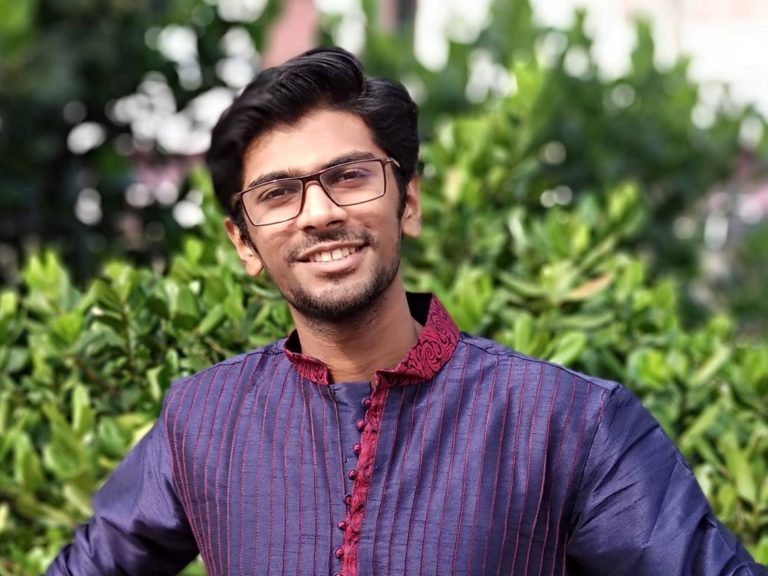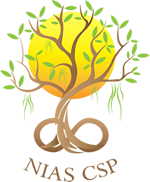
Harikrishnan N B
Harikrishnan N B is currently working as a Research Associate, Consciousness Studies Programme, School of Humanities, National Institute of Advanced Studies (NIAS), Indian Institute of Science Campus, Bengaluru. (July 2018 – Present). He is also pursuing his PhD under the guidance of Dr. Nithin Nagaraj, Associate Professor, NIAS. His PhD topic is “Investigations into Learning Algorithms in Intelligent Machines”. His research interests include brain inspired learning algorithms, signal processing, and applied mathematics. He also attempts to develop a theory of chaos based learning algorithms.
Educational Background:
Ph.D. (Ongoing)
Thesis-“Investigations into Learning Algorithms in Intelligent Machines”. Dec’18–Current
Thesis Advisor: Dr. Nithin Nagaraj, Associate Professor, NIAS, IISc Campus.
Master of Technology (Computational Engineering, 2018) Amrita Vishwa Vidyapeetham, Coimbatore, Tamil Nadu, India. Aug’16–Aug’18
Bachelor of Technology (Electronics and Communication Engineering, 2016) Amrita Vishwa Vidyapeetham, Amritapuri Campus, Kerala, India. Aug’12–Aug’16
Artificial Intelligence (AI) has undergone a major paradigm shift over the past decade due to the unreasonable effectiveness of deep learning algorithms. The deep learning algorithms include deep architectures like deep neural network, convolutional neural network, recurrent neural network and long short term memory etc. The unreasonability in these learning algorithms is due to the lack of a strong theoretical foundation on the working of deep learning. The term “deep” refers to the complexity of the architecture used in these learning algorithms. These algorithms learn from data i.e, they are “data-driven” techniques and has applications in various disciplines such as speech recognition, object detection, natural language processing which can be seen as some of the milestones of AI. One of the goals of AI is to develop a machine that mimics the human brain and even though deep learning has several applications, but it does not learn the way human brain learns. This signifies a wide gap between learning in algorithms and human brain. This motivates us to propose a brain inspired novel architecture for learning which uses properties such as stochastic resonance, chaotic synchronization, neural interference, multiplexing, neural plasticity, and causal reasoning so as to improve the performance of learning algorithms. The second part of research focuses on the development of a theoretical framework that explains the working of deep learning in order to justify the unreasonable effectiveness. The potential applications of the proposed brain inspired novel architecture are in the fields of healthcare and natural language processing.
- Journal Publication: Harikrishnan N. B., and Nithin Nagaraj. “When noise meets chaos: Stochastic resonance in Neurochaos Learning.” Neural Networks (2021), DOI:https://doi.org/10.1016/j.neunet.2021.06.025.
- Journal Publication: Harikrishnan N. B., Aditi Kathpalia, Snehanshu Saha, and Nithin Nagaraj. “ChaosNet: A chaos based artificial neural network architecture for classification.” Chaos: An Interdisciplinary Journal of Nonlinear Science 29, no. 11 (2019): 113125, DOI: https://doi.org/10.1063/1.5120831.
- Conference Proceedings: Harikrishnan N. B., and Nithin Nagaraj. “A novel chaos theory inspired neuronal architecture.” In 2019 Global Conference for Advancement in Technology (GCAT), pp. 1-6. IEEE, 2019, DOI: 10.1109/GCAT47503.2019.8978360.
- Conference Proceedings: Harikrishnan N. B., and Nithin Nagaraj. “Neurochaos Inspired Hybrid Machine Learning Architecture for Classification.” 2020 International Conference on Signal Processing and Communications (SPCOM). IEEE, 2020, DOI: 10.1109/SPCOM50965.2020.9179632.
- Conference Proceedings: Harikrishnan N. B., and Soman K. P. “Detecting ransomware using GURLS”, 2018 Second International Conference on Advances in Electronics, Computers and Communications (ICAECC). IEEE, Bengaluru,India, 2018, DOI: 10.1109/ICAECC.2018.8479444.
- Dynamical System Proof of Infinitude of Primes, TechTalks at NIAS, 08 December 2021 (Video).
- Neurochaos Learning, invited (online) talk at ARTPARK, Indian Institute of Science, Bengaluru, India, 02 September 2021 (Video). Click here for the presentation content.
- From Coffee Space to Vector Space: Foundations of Linear Algebra, invited (online) talk at Society for Industrial and Applied Mathematics (SIAM -IISc Student Chapter), Indian Institute of Science, Bengaluru, India, 28 August 2021 (Video). Click here for the presentation content.
- Dynamical System Proof of Infinitude of Primes, NIAS, 26 February 2021. The proof is available here: https://hofxbits.github.io/LectureNotes/assets/Dynamical_system_proof_infinity_primes.pdf
- How do Intelligent Machines Learn From Experience? Learning From Data, Quintessence of Being: Examining Existence and Experience online course conducted by the Consciousness Studies Programme, National Institute of Advanced Studies on 15 October 2020.
- Artificial Intelligence and Machine Consciousness, Reading Glass Thematic Discussion (along with Dr. Nithin Nagaraj), Consciousness Studies Programme, NIAS, Bengaluru (online), 26 August 2020.
- “Learning” from the Coronaviruses: Genome Classification and Complexity, NIAS Wednesday Discussion meeting (online – along with co-speakers Dr. Nithin Nagaraj and Dr. Pranay S Yadav ), NIAS, Bengaluru, 3 June 2020.
- A Gentle Introduction to Chaos, an invited talk as part of a workshop on ‘A primer on AI and data Science‘ for faculty and students, at Centre for Computational Engineering and Networking, Amrita Vishwa Vidyapeetham, Coimbatore, 28 January 2020.
- Turing Test – An Imitation Game to Determine Machine Intelligence, a technical talk for Reading Glass Presentation at Consciousness Studies Programme, National Institute of Advanced Studies, Bengaluru, 16 August 2019 (link).
- Assisted Dr. Nithin Nagaraj by delivering the first part of a series of lectures on Mathematical Techniques to Remove EEG Artifacts, at NIMHANS Bengaluru, 5 July 2019. This is part of a series of ongoing invited lectures at NIMHANS by Dr. Nithin Nagaraj on Mathematical Foundations in Neuroscience & Consciousness Studies Research.
- Foundations of Linear Algebra, PCA, SVD with Applications, an invited talk organized by Bengaluru School of AI community, NUMA Bengaluru, 6 April 2019. Click here for presentation content.
- Can Machines Learn to Feel?, a technical talk for Reading Glass Presentation at Consciousness Studies Programme, National Institute of Advanced Studies, Bengaluru, 18 December 2018 (link).
Coordinator: Reading Glass Presentation (Oct 2021 to Current)
- Master of Technology, CGPA: 8.72/10, First Class with Distinction (2018).
- Bachelor of Technology, CGPA: 8.2/10, Distinction (2016).
- Awarded Outstanding Volunteer Award in recognition of the outstanding contributions to the Amrita Vishwa Vidyapeetham IEEE Student Branch activities (2015).
- Certificate of Appreciation for an excellent contribution towards IEEE Student Branch activities of Amrita Vishwa Vidyapeetham (2014).

